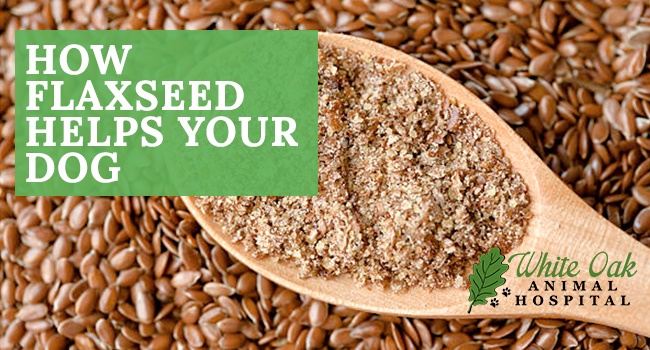
Flaxseed is one of nature’s greatest medicines.
Humans and pets alike can consume this unique plant and reap many benefits.
Because flax seeds are a rich source of α-linolenic acid (ALA, omega-3 fatty acid), lignans, and fiber, the benefits affect both bodily systems such as the cardiovascular disease and the treatment of specific diseases like diabetes, cancer, arthritis, osteoporosis and more.
Furthermore and in general terms, flax proteins boost overall heart health and immune system function.
The greatest benefit of flaxseed nutrition for pets though revolves around improved digestion and GI health through fiber and laxative effect.
As pets age, digestion slows down resulting in constipation.
Constipation leads to behaviors such as straining and scooting.
If your pup is constipated, consult your veterinarian to rule out a more serious health problem.
More than likely your veterinarian will recommend increasing your dog’s fiber intake or giving them a nutritional supplement containing flax.
Here’s some more information on the benefits of flax.
1. Flaxseed Nutrition Benefits Include Source Of Fatty Acids
When dogs scoot, there is often irritation around their bottoms.
This irritation can result from the act of scooting on hard surfaces or from straining to defecate.
Flaxseed contains essential fatty acids, such as omega-3 or alpha linolenic acid (ALA).
ALAs contribute to cell function and cell membrane structure.
These functions boost the health of your pup’s skin and coat.
Additionally, ALAs reduce inflammation, also benefiting your pups’ irritated skin and sensitive areas.
2. Flaxseed Aids Immune System Support
Flaxseed contains lignans.
Lignans are antioxidants that boost the immune system.
When your pup’s immune system is healthy, they can digestive foods more easily and maintain a healthy coat.
The relationship between immune health and digestion is intertwined.
The gut is responsible for much of the body’s ability to fight off illness.
Therefore, if your pup is constipated or has an illness, both can be symptoms of a weakened immune system.
Maintaining a healthy immune system and a healthy gut micro-biome are closely related.
3. Flaxseed Nutrition Benefits Include Improved Digestion
Flax seeds include both soluble and insoluble dietary fibers.
Insoluble fiber has two benefits.
First, it acts as a laxative.
Second, it prevents constipation, according to “Flax and flaxseed oil: an ancient medicine & modern functional food,” published in J Food Sci Technol.
These functions increase fecal bulk and reduce bowel transit time.
Meanwhile, water-soluble fiber helps maintain healthy blood sugar levels and lowers bad cholesterol.
According to a study on mice published in the American Physiological Society, flax may improve gut bacteria.
The study authors found “fermentation of flaxseed fibers in the gut changes the microbiota to improve metabolic health.”
How To Administer Flaxseed
When giving your pet flaxseed or increasing their fiber intake, make sure they drink plenty of water.
One of the best ways to give your pup flaxseed is in a supplement.
An all natural supplement containing beneficial pumpkin, dandelion root and psyllium husk, in addition to flaxseed may improve their digestion and reduce scooting.
Vet Classics No Scoot Soft Chews contain a proprietary blend of natural ingredients to gently support normal bowel function and healthy anal gland function by increasing the daily fiber intake.
If your pup seems constipated or irritated around her bottom, then try it out.
Related Posts
-
Top 5 Reasons To Give The Best Probiotics For Cats and Dogs
Probiotics are live microorganisms that occur naturally in fermented products. Foods such as yogurt and…
-
What Are The Health Benefits of Milk Thistle for Cats and Dogs?
Milk thistle is a plant used for centuries to treat liver ailments in humans. Although…
-
How Melatonin for Dogs Promotes Relaxation
Just like people, dogs experience stress for a number of reasons. Some dogs feel nervous…
-
Discover the Benefits of Digestive Enzymes for Dogs
Why Use Digestive Enzymes for Dogs? What do you really know about digestive enzymes for…









